Next of Kin Read online
Next of Kin
A novella
by
Dan Wells
Copyright © 2014 by Dan Wells. All rights reserved. Published in the United States of America by Fearful Symmetry, LLC. Cover design by Chersti Nieveen.
This is a work of fiction. Names, characters, businesses, places, events, and incidents are either the products of the author’s imagination or used in a fictitious manner. Any resemblance to actual persons, living or dead, or actual events is purely coincidental.
Dedication
This book is dedicated to Ben Olsen, who told me to just let the bomb explode. Not in this book, in a different one—it’s not like I’m going to put a spoiler right here in the dedication. Come on.
Acknowledgments
This book exists because of the hard work and invaluable expertise of many people, foremost among them my assistant, Chersti Nieveen, who offered suggestions on the manuscript, designed the cover, and handled a thousand other business-related tasks so that I could have time to write. The editing and proofing were done by Angela Eschler and Heidi Brockbank, and the production was carried out in a ridiculous rush—yet with flawless precision—by Christopher Bigelow, Eugene Woodbury, and Ben Crowder. Other helpful advice was given by Steve Diamond, Maija-Liisa Phipps, and my lovely wife, Dawn Wells.
More than anyone else, this book owes a debt of gratitude to my grandfather, Lowell Alley Wells, who was one of the greatest men I’ve ever met, and whose mind was eaten alive by Alzheimer’s Disease. I don’t think I could have become a horror writer without living through that horror. Grandpa, I’m glad you’re in a better place now. Say hi to Grandma for me.
Part One
I died again last night.
His name was Billy Chapman, found in a snowbank in the streetlight shadow of a parking garage, and when I drank his memories, his death became mine. I remembered stumbling out of the bar, into the biting cold through a thick haze of booze; I remembered slipping on the ice and the sudden, sharp pain. I remembered all thirty-five years of Billy’s life: his job and his boss and his car that didn’t work and his wife Rosie.
Oh, Rosie. He loved her more than anything in the world, and with his memories, now so did I. And neither of us would ever see her again.
The police said we died of exposure, and that’s common enough these days. In a good cold winter like this, most of my memories come from drunks who never made it home, or homeless wanderers who never made it anywhere. In warmer weather I die in other ways, but year after year, my story is the same. I live from death to death, sometimes two weeks, sometimes three, holding on as long as I can while my brain slips away like sand in an hourglass, grain by grain, loose and crumbling, until I can barely remember my own name and I have to find another. I drink their minds like a trembling addict, desperate and ashamed.
In the old days, I used to kill them myself, topping off my memory whenever and however I pleased, but those days didn’t last long. The others called me a fool for loving them, these tiny mortals with their tiny lives, but they never understood that I was one of them now. That my mind contained a hundred thousand human selves, and whatever fragment was me—my true self—was lost forever in that overwhelming crowd. I’ve lived as a banker in Nebraska, as a soldier in the Confederacy, as a Portuguese sailor in the Age of Exploration. I wove silk in the ancient dynasties; I fought and died on the banks of the Nile. The memories sink and surface like flotsam, more painful every time. How can I kill my own heart? How can I hurt them when their joys become my own? So I wait for them to die, and then I drink in peace.
And my mind is full of death.
Sometimes I die peacefully, drifting away as I sleep. These are the easiest deaths, especially if I know it’s coming, and my family is gathered close, and we talk and we laugh and we think about old times, and then I close my eyes and smile and dream. These are the easiest, but they are far too rare to count on. Most of my deaths are full of pain and fear: five endless, desperate seconds in a rolling car, or five agonizing months in a chemo drip and a painkiller cloud. I’ve even been murdered, more times than I can ever remember. Every time, though, every single time, the death itself is never the worst part. Leaving is never as bad as the people you leave behind.
Oh, Rosie.
Part Two
I don’t have many friends, as you might suspect. The people I know—or the people I think I know—don’t know me, and I’ve learned from painful experience that those artificial links are best left alone. As for the others like me, the Gifted who can do the things I do, I have no time for them. I am neither human nor Gifted, and even the ones who share my disdain for the others’ bloodlust—the ones who call us Cursed or Withered or Lost—don’t really have a place in my gap-riddled mind. I avoid them as I avoid everyone else. There is only one connection I keep, a man named Merrill Evans, and after drinking Billy Chapman’s memories, I visited Merrill the next day. I often visit him after a death. The old man understands me, whether he realizes it or not. Either way, I owe him, and it’s the least I can do.
I parked my car in the little lot behind the Whiteflower Assisted Living Center and went inside. It smelled like hand sanitizer and canned oxygen, and the air crackled with that impossible combination of reverent silence and too-boisterous laughter from nervous children, talking to loved ones in an exaggerated pastiche of the same conversations they had twenty years before.
“How are you, Dad? It’s me, Brian, your son. No, Gordon’s not here, that’s your brother. He died thirty years ago.”
“Hi Mom. I said, ‘HI MOM, HOW ARE YOU?’ Say hi, Maddy, but say it loud so she can hear you. MOM, THIS IS MADISON. Say hi, honey.”
“Do you remember our old house on third? The biggest house in the neighborhood, and my mother kept it so clean. Did you ever go to that house? Oh, it was wonderful, with a wrought-iron gate and the most beautiful roses in a bright white trellis on the wall. Do you remember when you pricked your finger there?”
I stood at the reception desk, and the nurse smiled. “Hello, Mr. Sexton. How are you today?”
“I’m fine, thanks. How’s Merrill doing?”
“I’m sure he’ll be great now that you’re here.” Her voice was chipper, but a hint of sourness crept into it as she talked. “I wish his family visited as often as you do. Do you know he has three grandchildren? And his family almost never visits at all? The cutest little grandchildren you’ve ever seen. They were in here over the summer.”
“I’m sure they come in when they can,” I said.
“They could come more than they do,” she said, shaking her head and picking up the phone. I put out my hand to stop her.
“Don’t bother calling—he’s not good over the phone. I’ll just show myself up.”
“That’s fine,” she said. “You know the way.” She smiled, and I smiled back, but I only got a step away before she called after me.
“Mr. Sexton? Remind me again how you know Mr. Evans?”
“I met him once,” I said, “not long before the . . . Alzheimer’s. He was a good man.”
“I’m sure he was,” she said. She’d only worked here a few years, so she didn’t know either of us well.
I turned again, my gaze rolling across the foyer full of visitors and residents and catching on one in particular: a teenage boy, skinny in his baggy coat, with ragged black hair that seemed almost deliberately uncombed; his own private rebellion against his mother or grandmother or whoever made him come in here today. He wasn’t talking to anybody, just sitting in the corner, waiting. Expressionless. I longed, sometimes, for that lack of feeling. It would make so many things so much simpler.
Whiteflower was one of the new-style Assisted Living Centers, more like a hotel than a hospital. Merrill Evans lived in room 312; a dark red va
se sat on the shelf outside his door, a sort of mental hook to help the residents find their rooms when they couldn’t remember the number. Merrill got the vase on a trip to San Francisco with his wife, and he remembers it sometimes. I knocked on his door and waited while he shuffled close enough to yell out.
“Who’s there?”
“It’s Elijah.” Not my real name, but the one I’ve been using the last twenty years or so. The only one he’d know me by, if he knew me at all.
“Who?”
So he didn’t know me today. “I’m your friend, Merrill. I’ve come to talk to you.”
“All my friends died in Vietnam.”
What little he remembered changed from day to day; today it looked like he remembered the war. “You fought in the Tet Offensive,” I told him. “I fought there, too.” It wasn’t even a lie.
He grumbled and opened the door, but his wrinkled face scowled when he saw me. “Hell, you didn’t fight in ’Nam. You weren’t even born yet.”
“I have a young face,” I said, which wasn’t technically a lie either. I’d looked about forty years old for centuries.
Merrill grumbled some more but opened the door. “Nothing else to do around this place,” he said, and walked back to his recliner, slowly but steadily. His mind was gone, but his body was still strong; he was sixty-five years old, younger than most of the residents in the building, but early onset Alzheimer’s was common enough, and he couldn’t take care of himself, so here he was. Healthy as a horse, empty as a drum.
“Did you bring my lunch?” he asked.
“I’m afraid not,” I said, closing the door behind me and picking up his phone. “Would you like me to order some?”
“If you don’t have my lunch, then why are you here?”
And thus began the slow spiral of conversation. “I’m your friend. I came to talk to you.”
“That’s right,” he said, waving curtly with his hand, as if wiping grime from some invisible window. “I remember, you just said that.” His words held a mixture of embarrassment and anger, the latter caused by the former. He knew he couldn’t remember anything, and he hated it; he was ashamed and embarrassed and angry at everything in the world—himself most of all, for who else could he blame? It was the most heartbreaking gesture in the world, the most painful tone of voice to ever hear, but it was one of the primary reasons I came here. Three weeks from now, as the sand in my mind leaked relentlessly away, I’d make that same gesture, say that same thing. I remember.
The biggest lie in the world.
Part Three
I worked in the morgue, driving the hearse during the night shift, because it was the best way to stay in constant, non-suspicious access to the recently dead. It was steady work, and if it kept me out of contact with the rest of the world, no matter. So much the better, really. I closed my blinds and slept by day, and by night I worked in the garage, maintaining our three hearses, keeping them clean and ready. The man on the day shift was nice enough. His name was Jacob, and I talked to him sometimes as I arrived for work and he was leaving. Sometimes he got sick and asked me to cover his shift, but I always made other arrangements, even paying for a temp out of my own pocket. I knew too many of the dead, and I knew their families, and I couldn’t bear to see them weeping over me when I was right there, alive and well, and why are you crying over me? Let’s leave this place and never come back. My own wife and children and parents and friends, as real in my memories as they ever were in the memories of the dead. I’d never gone to my own funeral, but I knew the temptation to talk to loved ones would be strong, so I stayed away.
That’s why it was such a shock, one week after Billy Chapman, when I saw Rosie at the grocery store.
My cart was full—cucumbers and olives and capers and feta, for I had brushed past a sheepskin coat in the aisle, and I remembered my days on Crete with such crystal, visceral clarity it brought me to tears, and I wanted a meal like we ate in the old days. I was walking to the checkout, wondering if it would taste right—if the American ingredients would hold the same flavor, or if my memory of some magical ur-salad would overpower any real salad I tried to recreate—when suddenly there she was, arriving at the line at the same time I did, as familiar by my side as she’d always been, and I said hello without even thinking about it. She nodded back, friendly but distant, with a sadness in her eyes that broke my heart. I opened my mouth to ask what was wrong before I remembered that her husband was dead, poor Billy in the ground not three days, and it wasn’t me who remembered her but him, and she didn’t know who I was. My hand was already reaching toward hers, and I pulled it back in terror.
Rosie, right here, real and physical and right here.
“Are you okay?” Her voice was lilting and sad and concerned—so like Rosie to feel concerned for others when she was already in so much pain herself. I’d heard that voice in lazy mornings, in joyful songs, in cries of passion, in heartsick wails that we could never have children. I loved that voice, but it wasn’t for me, and I felt like a voyeur even thinking about it, yet I couldn’t stop. I tried to speak but I couldn’t say a word, and she asked me again, “Are you okay?” I knew I had to speak or she’d just keep talking. I wanted to let her, but I knew it was wrong.
“I’m sorry,” I said, pulling my cart backward. “Please, you go first. I’ll find another checkout.”
“You’re very kind,” she said, and I tried to smile, but I had to turn away to hide the tears in my eyes.
My Rosie, who was never truly mine. I left the cart in the next aisle, and then I left the store, walking slowly so I wouldn’t make a scene. Her car was there in the parking lot, the same color I’d seen a hundred times, the same bumper sticker I’d begged her not to get, the same box of tissues that had been in the rear window for years. I turned and walked the opposite direction, leaving my car, stumbling through the ice, part of me crying out to go back to her and the other part insisting that no, I could never see her again, she wasn’t really my wife, there was nothing I could do. What could I possibly say? “Hi, you don’t know me, but I’ve known you for ten years, and I was married to you for eight, and I’m your husband, I’m Billy, I’m so sorry I went away.” She’d call the police. She’d mace me and run and scream that I was a maniac, that I was a stalker, that I was a psychopath. I loved her too much to do that.
I wandered the streets for two frozen hours, shivering in my coat, watching the streetlights through the snow. When I went back for my car, she was gone.
Part Four
A week later I couldn’t find my keys, and I knew it was starting. It’s a simple enough thing, to lose your keys, but I recognized the signs, and I knew that the sand was slipping away from the hourglass. Short-term memories went first, but even the long-term memories would disappear if I waited too long. I felt like Merrill sometimes, now and then forgetting even who I was but remembering, out of nowhere, some ancient event or person I hadn’t thought of in centuries. I had long ago forgotten my original self—anything I had left was cobbled together from the few memories that remained, an ever-shifting set of touchstones and anchor points that was all I had left of a real identity.
When I found the keys, I pulled my lanyard from the side-table drawer and clipped them to my belt. I made myself a lunch to take to work, sealing it carefully in a plastic container, and when I opened my bag to put it in, I saw another plastic container already sitting there, not thirty minutes old. I put a note on the second lunch, explaining its existence to my future self, and left for work. I said hello to Ted, and he told me his name was Jacob, that Ted had quit two years ago, and I apologized for the slip.
“Of course. I remember.”
I’d chosen this city for its size: big enough to have a steady flow of the dead, but small enough that most of those bodies came from natural causes. I’ve died of heart disease more times than I can count. The death rate in our county is around 10,000 per year, which is just over 27 per day; about half of those are in the city itself, shared between
two dozen morgues and mortuaries, which gives mine a new body every five or six days on average. We’d had one the day before, but I’d chosen to wait. I wasn’t bad yet, and the woman had drowned, which is a death I try to avoid when I can. My memory always seemed to erode faster toward the end, though, and I would need to drink the very next mind that came through.
I ran through my maintenance checks on all three hearses, finding solace in the comfortable routine of reading lists and checking boxes. It was simple, the same routine every time. There was nothing to remember, so I had nothing to forget. When I finished, I sat in the office doing Sudoku, folding the little paper book in half and licking the tip of my pencil like an old man. Logic problems and strategy games are supposed to be good for memory retention, exercising your brain like a muscle, but I don’t know if I’ve ever seen any benefit from it. I don’t even know if the standard rules apply to my neurochemistry. I’d been doing Sudoku for so many years, I doubt it would exercise my brain at all anymore, regardless; it was an action as rote as the checklist on the hearses. When the phone rang I sighed in relief, took careful notes on where to pick up the new body, and left.
Another drunk, homeless this time. They found his body next to an overpass, fifty feet or so from the nest of blankets that was probably his home. It was several degrees below freezing, and his body bore no signs of attack, so they ruled it another accidental death by exposure.
His memory told another story.
His name was Frank McClellan, and he grew up in California; we walked on the beaches as a child, barefoot and tan, but we had never liked our father and the memories of our screaming arguments burned like coals inside my skull. We’d left home at sixteen, traveling here and there around the country, reconnecting with our sister for a few years in our twenties before drifting away again. Eventually we’d fallen into drugs and prostitution, though we’d always been proud that we’d stayed away from theft and robbery. I felt his pride, and his loneliness, and the bone-aching chill that seemed to haunt him even in the summer, and then last night I watched a man approach us—his face nearly buried in a thick, black scarf—and gesture to the shadows with a wad of dollar bills. We followed him, knowing exactly what was wanted in the wordless transaction, and there in the darkness he killed us.

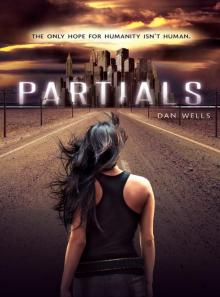 Partials
Partials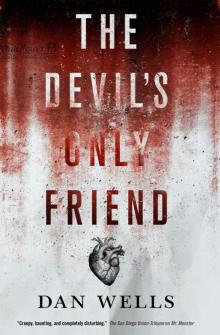 The Devil's Only Friend
The Devil's Only Friend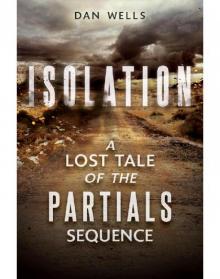 Isolation
Isolation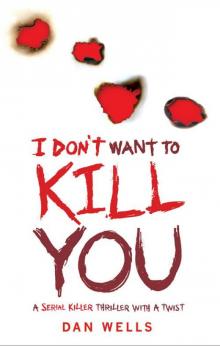 I Don't Want to Kill You
I Don't Want to Kill You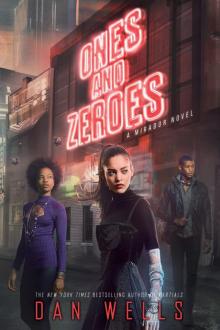 Ones and Zeroes
Ones and Zeroes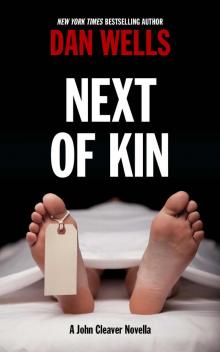 Next of Kin
Next of Kin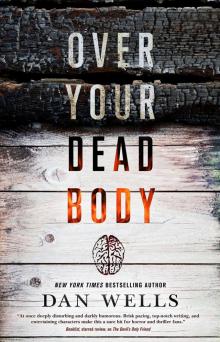 Over Your Dead Body
Over Your Dead Body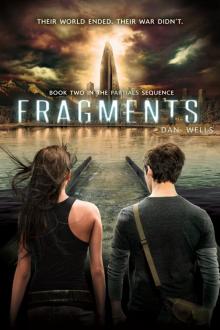 Fragments
Fragments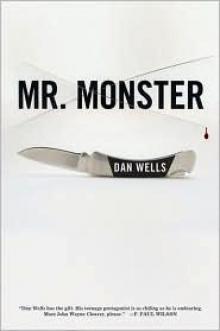 Mr. Monster
Mr. Monster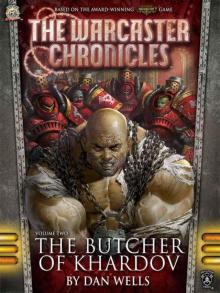 The Butcher of Khardov
The Butcher of Khardov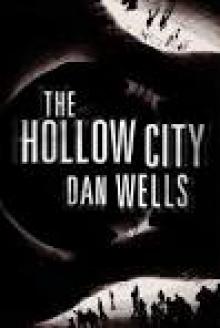 I AM NO T A S E RI AL KI L L E R
I AM NO T A S E RI AL KI L L E R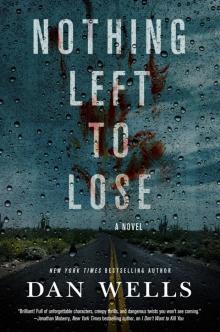 Nothing Left to Lose--A Novel
Nothing Left to Lose--A Novel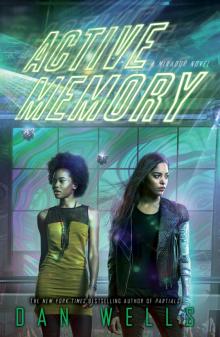 Active Memory
Active Memory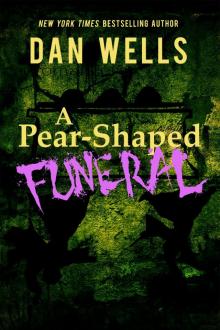 A Pear-Shaped Funeral
A Pear-Shaped Funeral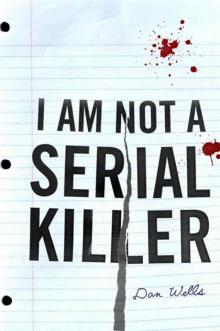 I Am Not a Serial Killer
I Am Not a Serial Killer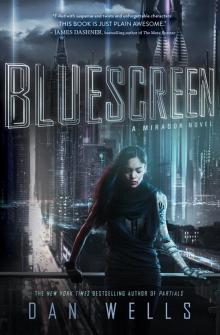 Bluescreen
Bluescreen Ruins
Ruins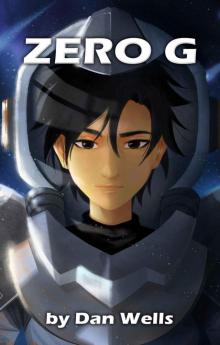 Zero G
Zero G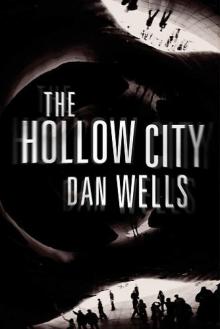 The Hollow City
The Hollow City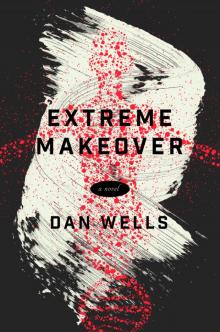 Extreme Makeover
Extreme Makeover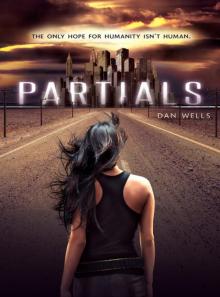 Partials p-1
Partials p-1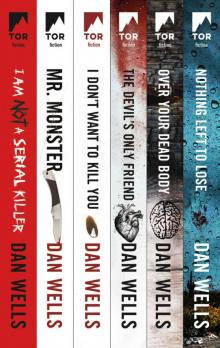 The Complete John Wayne Cleaver Series: I Am Not a Serial Killer, Mr. Monster, I Don't Want to Kill You, Devil's Only Friend, Over Your Dead Body, Nothing Left to Lose
The Complete John Wayne Cleaver Series: I Am Not a Serial Killer, Mr. Monster, I Don't Want to Kill You, Devil's Only Friend, Over Your Dead Body, Nothing Left to Lose